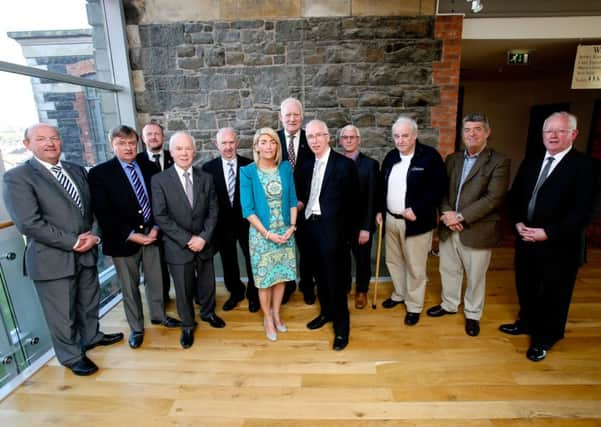‘Planning is all about shaping the future of our borough’


Q: What is the significance of the transfer of planning powers to local councils?
A: Now that planning has transferred, in my opinion it is probably one of the most influential, interesting and, undoubtedly, challenging aspects of our new responsibilities. People within our borough are now closer to the decision making process and can engage with the planning process in a meaningful way.
Advertisement
Hide AdAdvertisement
Hide AdFor me, planning is all about shaping the future of our borough and endeavouring to achieve the right development in the right place at the right time. By making positive planning decisions now and setting out a framework for future development in our new Local Development Plan, we can create a sustainable, prosperous and attractive place for residents and visitors alike. Our aspiration is to create a place where people take pride in their surroundings, where we look after our natural and built heritage and support sustainable growth for future generations.
I believe good planning can help achieve this and will be supported by the council’s other new powers and functions, including Community Planning, which has already transferred and Regeneration powers, which are expected to transfer in April 2016.
Our Planning Committee’s aim is to ensure we have an efficient planning process that promotes positive development. To date we have taken decisions on some 40 planning applications and 14 enforcement cases.
Q: What are the council’s new planning responsibilities and the role of the committee?
Advertisement
Hide AdAdvertisement
Hide AdA: Individual planning applications are often how most local people engage with the planning system, either as an applicant wishing to build, or sometimes as an objector or supporter of various development schemes.
All planning applications are now registered as local, major or regionally significant. The council is responsible for determining all local and major schemes, which comprise the vast bulk of applications. The council is also responsible for a range of other planning controls, such as listed building consent and works to protected trees.
The Planning Committee considers all major proposals affecting the borough as well as contentious or sensitive proposals. We now make the decisions on these cases.
The council also has the power to investigate alleged breaches of planning control. The role of the Planning Committee is to determine whether formal enforcement action should be taken.
Advertisement
Hide AdAdvertisement
Hide AdMost significantly, the council is now responsible for producing a new Local Development Plan and this will set out what the borough should look like and how land should be used and developed over the next 20 years. The committee’s role is to provide oversight to the plan preparation process and along with the other members of council, agree the contents of the plan. This process will also link with the Community Plan for the area, which will seek to ‘join up’ services and resources locally to achieve better outcomes.
We are committed to consulting widely with residents, businesses, local groups and organisations on the new plan. This will enable everyone to have a say in how we should shape our area in the future. This is all part of the new democratic accountability in planning and something that my fellow committee members and I are proud to be involved in.
Q: When does the committee meet?
A: The committee meets on the third Monday of every month in Mossley Mill and the meeting is open to members of the public. We have introduced public speaking rights for applicants/agents, objectors and supporters for any planning application coming before the committee. There is a user friendly document available on the council’s website - www.antrimandnewtownabbey.gov.uk/planninggetinvolved - designed to help people decide if they are eligible to speak and how to go about it.
Q: Where can people get information on Planning Committee meetings?
Advertisement
Hide AdAdvertisement
Hide AdA: There is a Planning Committee Meetings page in the Planning section of the council’s website. This provides information about the committee, our meetings and you can see the schedule of applications to be presented each month to the committee for determination. The minutes of our meetings are also available here as well as an audio recording, so that you can hear how issues are discussed and how decisions are reached.
Q: Who are the councillors on the committee?
Including the vice-chairperson, Alderman Tom Campbell (Alliance) and myself, the committee has 12 members. The other committee members are: Alderman Fraser Agnew (UUP), Councillor Trevor Beatty (DUP), Councillor Jim Bingham (UUP), Councillor Henry Cushinan (SF), Councillor Brian Duffin (SDLP), Councillor Thomas Hogg (DUP), Councillor David Hollis (TUV), Councillor Stephen Ross (DUP), Alderman John Smyth (DUP) and Councillor Billy Webb (Alliance).
Through the Planning Committee, decisions are now in the hands of those with local knowledge and this is enabling the council to respond in a more meaningful way to local needs. As the first chairperson of this new committee, I hope I am contributing in some small way to our new role as decision-makers and place shapers.
Q: How do we get in touch with members of the committee?
A: Our telephone numbers and email addresses are on the council’s website - www.antrimandnewtownabbey.gov.uk/councillors
Advertisement
Hide AdAdvertisement
Hide AdWeekly planning advertisements will be advertised in the Newtownabbey Times, on www.antrimandnewtownabbey.gov.uk/planning or you can access this from the planning portal - www.planningni.gov.uk
To contact the local planning office Tel: 0300 123 6677; email [email protected] or visit www.antrimandnewtownabbey.gov.uk/planning